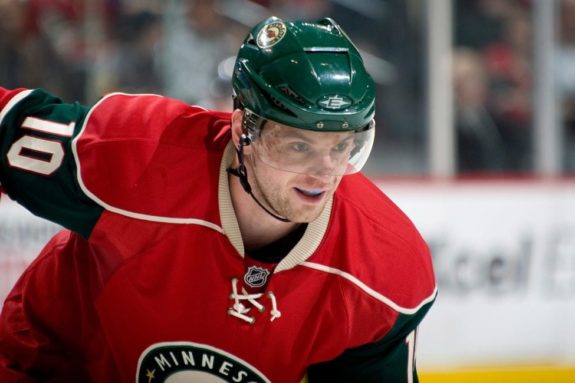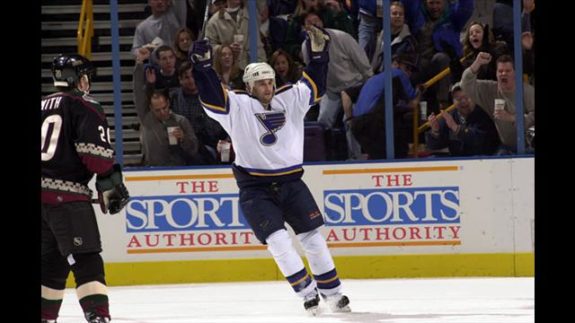In the annals of NHL history, the 2007-08 season stands out as a unique and intriguing chapter for the Minnesota Wild. While the captaincy in hockey often symbolizes leadership, direction, and unity, the Wild took a daring departure from convention by appointing not one, not two, but five captains for that single season. This unprecedented move set them apart, sparking discussions and debates to this day. No one will ever understand why they rotated through five different players including Marian Gaborik, Pavol Demitra, Mark Parrish, Brian Rolston, and Nick Schultz.
Historical Context
Founded in 2000 as an expansion team, the Wild went their first six seasons without naming a captain and rotating the alternate captains with up to six players in a single season. This is not unprecedented, it is still something teams do to this day if they do not have a captain. But they took it a step further and decided to rotate the “C” between five different players throughout the season. Each player wore the “C” for a month at a time before it was passed along to the next player.
The Significance of the Five-Captain System
The decision to embrace the five-captain system was rooted in a desire to harness the diverse strengths and leadership styles within the team. By distributing the captaincy across diverse players, the Wild aimed to foster a collective leadership approach that represented different facets of the team’s identity. The strange approach was a bold experiment, testing the boundaries of what conventional wisdom dictated about captaincy while hoping to find the perfect leader for the team.
The Five Captains & Their Impact
Marian Gaborik
As the team’s most dynamic offensive player, Gaborik brought an innate ability to lead by example on the ice. His skill and work ethic inspired his teammates to push their limits, and his scoring prowess set the tone for the team’s offensive efforts.

His captaincy underlined the importance of individual excellence within the collective structure of the team. He finished the season with 42 goals and 41 assists in what ended up being his second-best season statistically by the end of his career, which ended in 2017-18.
Brian Rolston
Known for his dedication and strong two-way play, Rolston embodied the values of discipline and consistency. He was a calming presence on the ice, making intelligent decisions and influencing his teammates through strong defensive play and timely offensive contributions. His captaincy highlighted the significance of responsible leadership and playing “the right way”. Unfortunately for the Wild, he was one of the three captains in 2007-08 to not return for the 2008-09 season.
Nick Schultz
A rugged defenseman with unwavering dedication, Schultz epitomized the blue-collar work ethic. His commitment to physical play, shot-blocking and sacrificing for the team demonstrated the importance of resilience and selflessness.
Related: 4 Wild Candidates to Replace Dumba as Alternate Captain
He embodied the team-first mentality on and off the ice. Schultz was an underrated player in his 10 seasons with the Wild as he did not bring much offensively but could always be relied upon to play against other teams’ top lines and play in pressure cooker situations.
Pavol Demitra
The fifth-highest-scoring Slovak player to this date, Demitra was a dynamic player in the offensive zone with incredible playmaking abilities. He recorded 54 points in 68 games that season as a 33-year-old in the NHL.
He was the type of player who brought people together and was popular with everyone he played with. Like Rolston, Demitra also left the team in the summer following the 2007-08 season.
Mark Parrish
Parrish assumed the captaincy for the Wild in two different months throughout the 2007-08 season. He was in the second year of a three-year deal that he signed with his hometown team. He was not offensively gifted like Gaborik or Demitra but he gave it 110 percent every time he put on the jersey, embodying the work ethic needed to be successful in the NHL. He was the third of the five captains that season to not be part of the team in 2008-09 but unlike the others, he was bought out to save the team money.
Collective Impact
The five captains complemented one another, forming a well-rounded leadership unit that addressed all aspects of the game. This shared responsibility fostered a sense of unity and camaraderie within the team, transcending traditional NHL leadership groups.

The players embraced their roles, recognizing that each captain brought a unique skill set to the table, and by doing so the team finished first in the Central Division but unfortunately lost in the first round to the Colorado Avalanche in six games.
Legacy and Reflection
The five-captain system remains an anomaly in the NHL’s history. While it may not have become a widespread trend, it undoubtedly left an enduring legacy within the league. The experiment challenged the preconceived notion of how leadership functions within an NHL team. Although different players may speak up at different times during a season, teams would rather have one captain and two to three alternate captains. This gives teams a stable leader that they can rely upon all throughout the season rather than it changing every month or so.
In the end, the Wild’s attempt to deviate from tradition paid off throughout the regular season but did not work when it came time for playoff hockey. The legacy of the five-captain team continues to puzzle those who come across it and inspire conversation around why the Wild decided to go with such an odd leadership structure in 2007-08.
